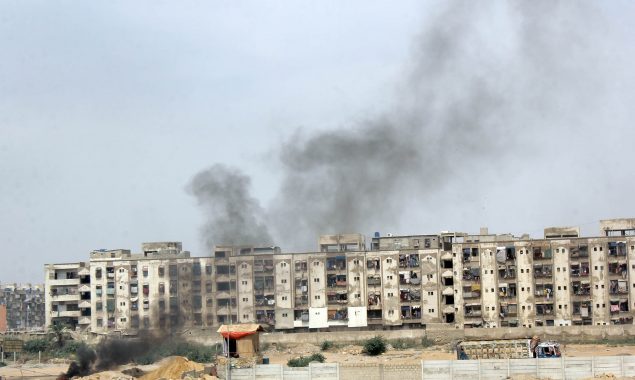
KARACHI: As the international community observed World Cities Day on October 31, the predicament of certain major cities, in developing countries, including Karachi and Lahore, is crystal clear to all.
The day aims to push forward cooperation among countries in meeting opportunities and addressing the challenges of urbanisation around the world.
But things were not always like this. In its early days, all of Karachi’s major boulevards including MA Jinnah Road (previously known as Bandar Road), Elphinstone Street and Zaibunnisa Street were reportedly washed almost every week. It was known to be a quiet and peaceful city. There was no litter pilling on the roadsides.
Women felt safe to walk on the streets. There was no serious issue of power outage.
The question, however, is that can we go back to this old Karachi?
Probably not, as Karachi’s population had now reached an all-time high of 21.53 million people in June 2020 against a population of 3.75m back in June 1950.
Unfortunately, the treatment currently meted out to the birthplace of the country’s founder, is indeed deplorable. Karachi being the country’s major bread earner deserves better.
Although Karachi was and still is the economic hub, the most cosmopolitan, the most literate and, indeed, a vibrant city, it is also the most polluted, the most complex and, above all, the most troubled place to live in. It is time for the city’s administration to ponder what has gone wrong.
Recently, Pakistan Muslim League-Nawaz president Shehbaz Sharif claimed to “turn Karachi into Paris.” As ironic as it may sound, the city can definitely be turned into a place worth living. All that is required is political will to eliminate those who are creating hurdles in the progress and well-being of the citizens.
Power woes
The late Siraj Kassam Teli, a former boss of the Karachi Chamber of Commerce & Industry (KCCI), once suggested at Nepra’s K-Electric (KE) public hearing that the only way to curb power woes of the citizens was to end the monopoly of KE. He recommended setting up a power generation and distribution company in Karachi offered by the business community. This was an encouraging proposal made at a time when the city needed such power distribution.
Karachi, being the financial and industrial centre of the country, contributes 65 per cent to the national exchequer, for which it deserves a smooth, flawless and uninterrupted supply of electricity at a very competitive rate. This, however, is not possible with monopolistic competition.
As such, the KCCI made a suggestion to Nepra to end the monopoly of KE on sale of electricity to consumers in Karachi, who were suffering at the hands of the electricity supply company for the past 17 years, and ask the private sector to form power-distribution companies.
Water shortage
The scarcity of water is another serious issue. The city needs at least 1,000 MGD (million gallons daily) water for its households, industries and other essential infrastructure. The current availability stands at 650 MGD. The solution to the problem was the completion of K-4 project which was approved in 2014 but is yet to be completed. The project was to be funded jointly by the provincial government as well as the federal government.
The K-4 project envisaged supply of 650 MGD of drinking water per day to Karachi.
Now that the project is being handled by the federal government with the support of the Sindh government and Wapda, it is possible that the city could overcome its water crisis.
The authorities need to fast-track the project in order to save time and help citizens get rid of the tanker mafia.
Haphazard growth
With the passage of time, urban cleanliness went from bad to worse as garbage was scattered in almost every locality. The residential areas had been converted into commercial areas, making public spaces even more congested when it comes to walkability.
Moreover, footpaths, service roads and parks have been encroached upon. There appears to be no light at the end of the tunnel when it comes to Karachi’s cleanliness situation.
Commenting on the city’ situation, veteran architect Arif Hasan once stated that this can only be changed through a well-thought-out plan for the city that is supported by civil society, academia, community organisations and the business community.
According to a report, the Sindh government, through the Sindh Solid Waste Management Board (SSWMB), had inked two agreements with Chinese and Spanish firms for lifting and dumping 3,500 tonnes of garbage from Korangi and Central districts from the second week of August.
Under the agreement, the Chinese firm would install a 40MW waste-to-energy plant and also establish another plant to produce solid waste management related machinery in Karachi.
This initiative, however, does not guarantee a clean city. Senior citizens say such projects were ‘exhibitory’ in nature and would not serve the actual purpose.
Similarly, the residents of Lahore are not happy with the garbage-lifting arrangements either.
According to a report, residents in various localities of the city had expressed grave concern over the Lahore Waste Management Company (LWMC)’s failure to lift solid waste littered in various areas, posing a serious threat to public health.
Lahore’s locals said the waste management company was not lifting the garbage on a daily basis in their respective areas despite public complaints.
They added that in the past, LWMC was lifting the garbage every day.
Keeping in view the situation of Lahore, and the experiences of its residents, one can anticipate that such arrangements in Karachi may not work either.
The ‘revival of Karachi’ as a clean city may be a daunting task but ownership by the locals could make a difference.
With a city administrator taking care of the metropolis’s matters, Karachi’s citizens could only hope there is light at the end of the tunnel.
Catch all the Pakistan News, Breaking News Event and Latest News Updates on The BOL News
Download The BOL News App to get the Daily News Update & Follow us on Google News.




